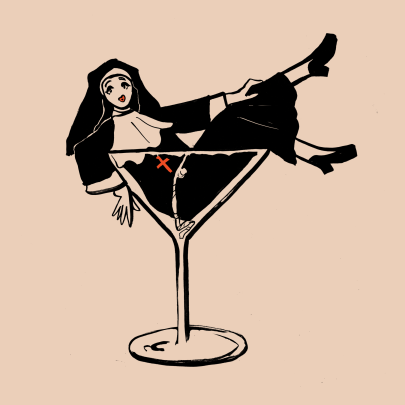Feb 24, 2014 Theatre
The action takes place on a coolly elegant set, designed by Tracy Grant Lord. Julia (Lisa Chappell) and Jane (Claire Dougan), restless within the confines of seven years of happy married life, are aroused from tedium by the imminent arrival of Maurice (Jonathan Allen), Frenchman (read exotic, sexy) and lover to both before their marriages. While their respective husbands (Stephen Lovatt as Fred, and Stelios Yiakmis as Willy) play golf, they wait, attended by a new maid, Saunders (Priyanka Xi), for Maurice’s arrival.
Anticipation propels them into reminiscence, the bottle, and eventually alcohol-fuelled competitive resentment and quarrelling. Next morning, each believing the other to have not only found Maurice but run off with him, they tell tales to the returning — and disbelieving — husbands. However, when Maurice himself arrives alone, faces and marriages must be saved: Maurice, generous, worldly and of course French, comes to the rescue and all is seemingly forgiven.
Within the comedy, there is some implicit commentary on the unjust secondary status of women, and a mild rebuke to the unromantic, tweedy, golf-playing, English husbands, but it’s coupled with tame clichés: the French lover, youthful affairs in romantic Italian cities — Venice and Pisa.
Contemporary resonance struggles to find form, effortlessly obscured by the all too recognisable uproar of the 1920s style and values of the British upper-classes. Hawthorne’s attempt at a traditional production reinforces rather than decreases distance and any social comment intended by Coward on the absurdity of social mores remains locked in a 1920s time warp.
Despite the occasional inconsistency in accent, the acting is competent: Chappell, a languid and sophisticated Julia; Dougan, by turns wild, extravagant and petulant as Jane. Lovatt and Yiakmis extract suitably fine humour as the unruffled and unobservant husbands, while Allen gives Maurice a Gallic charm and Xi embodies the new servant with an amiable pertness. John Gibson’s sound design delivers the welcome pleasure of hearing Coward, the master, singing his own songs as part of scene-setting and commentary.
Coward is difficult to pull off, requiring a brittle wafer-thin irony that both conceals and reveals, a fizzy champagne lightness essential to ensure his wit bubbles and froths. However, Hawthorne’s occasionally heavy-handed direction produces flatness and an imbalance between cultivated restraint and exuberance. Thus the production, uneasy in its genre, struggles to fly.
The audience’s role here is to admire, be entertained by shallow social vanities, empty self-gratifications of the wealthy and privileged, who suck on oysters, sup champagne and suffer small indignities. The fact that audiences do and will is a comment on our times as much as on the 1920s. Sadly, despite Coward’s mastery of the witty one-liner, Fallen Angels is never more than a silly, frivolous play whose “strange enchantment” proved elusive on the night.





